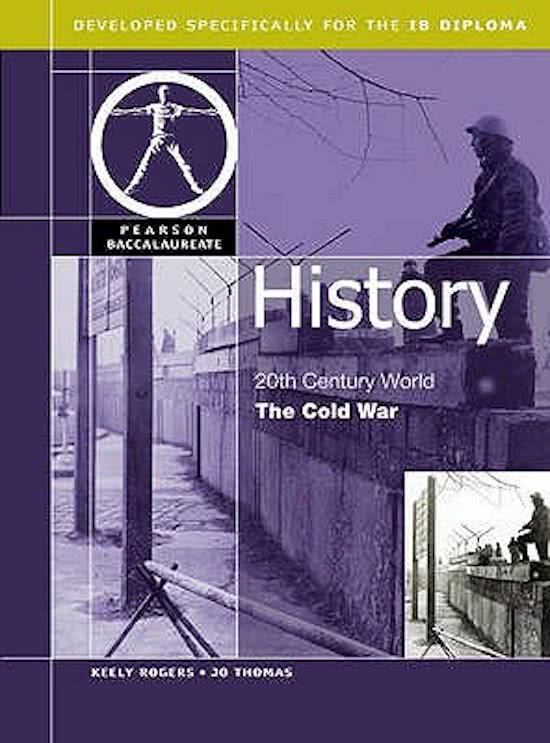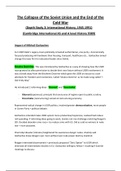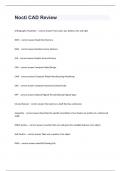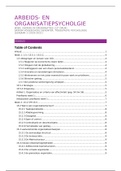Cold War
(Depth Study 3: International History, 1945-1991)
(Cambridge International AS and A level History 9389)
Impact of Mikhail Gorbachev
For USSR Stalin's Legacy mean politically remained authoritarian, one party + Economically
focused producing mili hardware than housing, transport, healthcare etc… Gorbachev aimed
change this (was first Uni educated leader since Stalin).
Sinatra Doctrine- This was introduced by Gorbachev as a way of showing how the USSR
now granted its allies permission to decide their own future without USSR involvement. It
was a break away from the Brezhnev Doctrine which gave the USSR an excuse to crush
attempts for freedom and revolutions. Called ‘Sinatra Doctrine’ as he made song called “I
Did It My Way”
He introduced 2 reforming ideas- ‘Glasnost’ and ‘Perestroika’.
- Glasnost (openness): principle that every area of regime open to public scrutiny.
- Perestroika (restructuring): aimed at restructuring economy.
Represented radical change in USSR politics, involved greater democratization, more people
in Comm Party + political debate.
Gorbachev intended make USSR system more productive/responsive, realised had reduce
mili spending. If reforming ideas going to work, Soviets not rise challenge matching Reagan's
SDI. Decided abandon arms race + try reduce arms with US. Did as said no winners in nuke
war + econ purposes.
Chernobyl disaster (Ukraine) heightened his awareness danger nukes. Anatoly said
Gorbachev knew dangers war. Even without war nuke power destroy mankind.
Reagan interested disarmament + previously proposed “Zero Option” to USSR which
eliminate all Intermediate missiles in EU. Gorbachev willing to follow + resulting 4 Summit
meetings to discuss:
, - Geneva Summit (Nov 1985): not a lot of progress, leaders agreed no winner in nuke
war.
- Reykjavik Summit (Oct 1986): ended without agreement as disagreement SDI.
Gorbachev said SDI remain in lab while Reagan disagree. Talks also covered most
arms control proposals between two powers.
- Washington Summit (Dec 1987): Intermediate Range Nuclear Force Treaty (INF)
signed, agreed abolish weapons like Intermediate + Short range missiles. First
important step reduce stockpile. Agreement for inspections destructive missiles.
- Moscow Summit (Dec 1987): Disagreement over SDI, arms reduction negotiations
continued. Reagan confessed no longer believed “evil empire”.
Gorbachev's foreign policies reassuring to West. 1988 said withdraw USSR Afghanistan +
removed aid dev World.
Thawing CW continued under Bush at Malta Summit US - USSR leaders 1989. Soviet minister
said buried CW.
Role of Reagan?
Gorbachev willing tackle issue nukes, new style politics + doing business with West caused
breakdown CW. Some say his approach USSR 1980s crucial pushing them into arms
negotiations. Others say he played important role as influenced by anti-nuclearism which
convince Gorbachev halt arms race.
Long-term Factors for End of CW
Role of USSR Economy?
Actions Reagan + Gorbachev important but long-term also end CW. Death Brezhnev 1982,
caused USSR pol + econ policies crisis.
Foreign policy resources high under Brezhnev. He achieved parity with US in nuke field. His
period known as stagnation as lack spending consumer goods + domestic economy as
whole.
Left his successors with outdated Stalinist regime. Grain imported US + many below poverty.
High alcoholism.
Gorbachev inherited troubled economy. Forced to make internal + negotiations with West.






